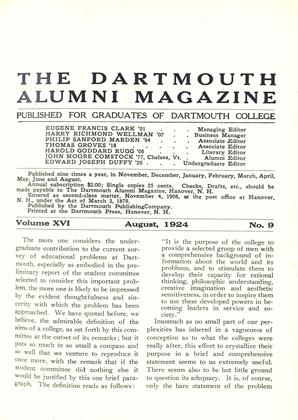"Now that examinations come around once again and juniors may sit quite legitimately on the senior fence there is a distinct feeling of relief. Such a feeling results naturally at the close of a "hectic" year, an adjective whose application to the past eight months few will deny. Yet while the year has been "hectic" it has "stimulating" as well. Professors claim that there is a new "spirit of challenge" in the classroom, the spirit for which they have long been striving. Dartmouth pats itself on the back and says, "Hurrah, I am no longer content with smug complacency." A't the same time there is a danger of lapsing into a smug complacency of another color, an individualism gone rampant, a will to be different merely for the sake of difference.
"Somewhere there must be a mean between rampant individualism and the complete satisfaction of following the leader, a better combination of individual thought and group re lationship. That is what the College must strive for next year. All of the good work cannot be done in one year. The leaders of the senior class have done their share—a huge share—of the work of stimulation. It remains for next year's seniors and juniors and sophomores to judge fairly the changes recently instituted and to make their criticisms constructive.
"It is to be hoped that the coming year will not be as hectic as, the past. But the stimulation must remain. The 1925 Palaeopitus has decided to adopt a policy of conservatism. Should such a policy, however, prove to be a damper on educational stimulus, the 1925 Palaeopitus must turn around and make the year hectic. Educational stimulus is, after all, the essential."
Then, another good sign, is the revelation that athle'ics and other extra-curricular activity indulgence do not harm scholarship. Much hue and cry has been raised against the "activity" man, many claiming that he is not fully availing .himself of the Dartmouth educational facilities, due to his other work. But the Bureau of Personnel Research reports that these men, and athletes in particular, are higher than the average in scholarship.
According to this report 9 per cent of the men in College achieved honor standing last year while of the men belonging to non-athletic organizations 13 per cent achieved such standing and the number of athletes receiving honors was equal to IS per cent of the men engaged in athletics.
Considering the groupings of men in the College according to intelligence tests given yearly the, figures are also interesting. Twentytwo per cent of the men in the College were placed in group one, the highest division, and 28 per cent of the men in non-athletic organizations were placed in this group. The percentage of athletes in the group was also 22 per cent, the same figure as for the College as a whole. In group five, the lowest group in intelligence test ratings were 18 per cent of the total enrollment of the College, 16 per cent of the men in non-athletic organizations, and only 11 per cent of the men in athletics. Following are the tables:
Intelligence Test Groups 123 4 5 Men in College 22 20 20 20 18 Men in non-athl. org 28 18 21 17 16 Men in athletic org 22 28 19 20 11 It will be noted that SO per cent of the men engaged in athletics rank in the highest intelligence test groups. Scholarship Groups. AB C D Men in College 9 53 32 6 Men in non-athl. org 13 61 24 2 Men in athletic org IS 60 23 2 A: Honor standing. B : Those making satisfactory progress but not obtaining honors. C : Those who at the present rate of progress would not receive a degree in four years. D: Those separated from college because of poor scholarship.
It will be noted that 75 per cent of the college athletes rank in the two highest scholarship groups.
On top of this, the Dartmouth takes a wholly different stand on the "athlete" and extracurricular activity indulgence from that of the preceding directorate, as follows:
 View Full Issue
View Full Issue
More From This Issue
-
 Article
ArticleThe more one considers
August 1924 -
 Lettter from the Editor
Lettter from the EditorCOMMENCEMENT 1924
August 1924 -
 Article
ArticleRECIPIENTS OF HONORARY DEGREES
August 1924 -
 Article
ArticleVARIATIONS IN THE SCHOLARSHIP OF INDIVIDUALS
August 1924 -
 Class Notes
Class NotesClass of 1903
August 1924 By Perley E. Whelden -
 Class Notes
Class NotesClass of 1903
August 1924 By Perley E. Whelden







